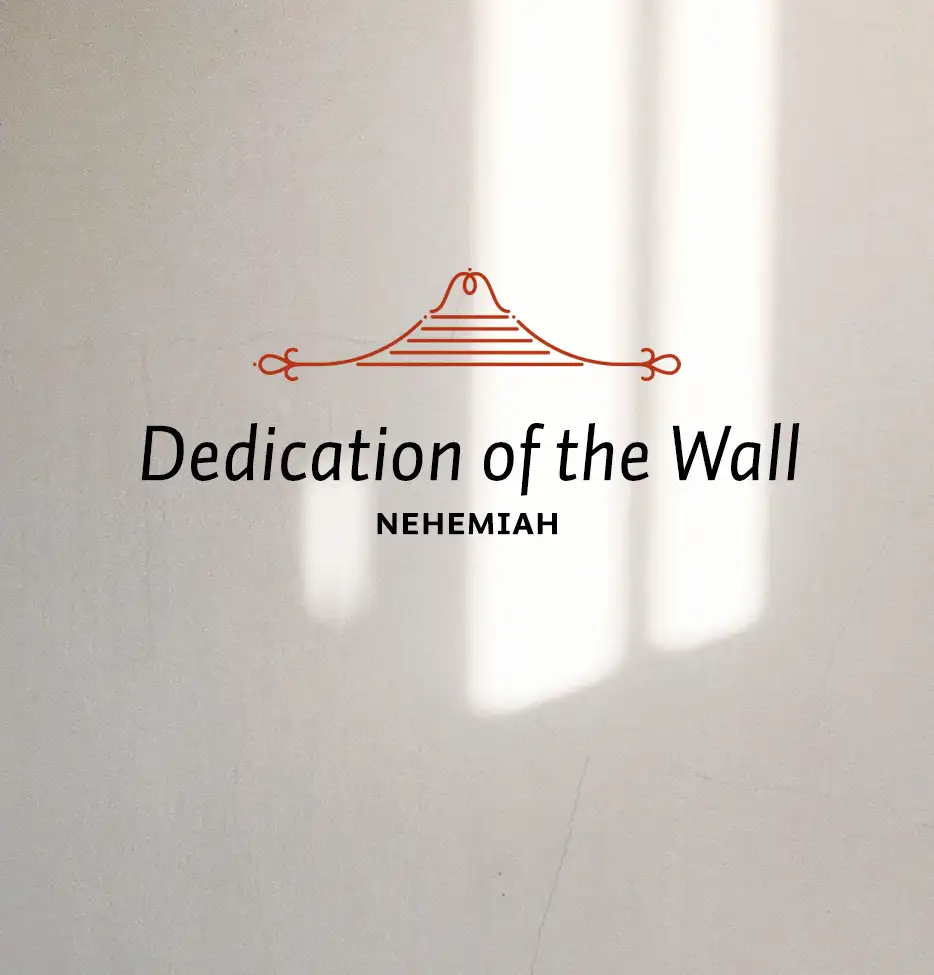In Nehemiah 12 the priests and Levites were the first to dedicate (or, as it says, “purify”) themselves, which was fitting since they were the ones who were to conduct the dedication service. We are not told of what this work of purification consisted, but it was probably ceremonial washings of themselves and their clothes, fasting, abstinence from sexual intercourse, and sin offerings.1
The people were next. They probably merely washed themselves and their clothing,2 though they may have been asked to abstain from sexual relations too.3
The gates and wall would have been dedicated by using a hyssop brush to sprinkle them with the blood of sacrifices and with water.4
After we are told about the dedication of the people, followed by a ceremonial sprinkling of the gates and wall, we are told of the great service of dedication itself. As I indicated above, it consisted of two parts: first, a festive wall-walk, in which Nehemiah led one group of the people in one direction while Ezra led a second group of the people in the other direction; and second, a formal service at the temple at which the choirs sang and the priests offered sacrifices.
In my opinion, the details of what took place in these services are less significant than the spirit in which they were conducted. And when I think of the celebration in terms of this overall spirit or tone, I notice two very important things.
1. Singing. According to Nehemiah’s account, the chief place in these services was given to the choirs and the instrumentalists—the players of “cymbals, harps and lyres” (v. 27)—who accompanied them. These led each of the two groups around the wall, the choirs no doubt singing all the way. And then, when the service was ready to begin, the choirs took their places first and led the singing. The music was so important to the occasion that the name of the choir director is recorded. His name was Jezrahiah.
What did the people sing? The psalms certainly. We do not know which ones, of course. But I would be surprised if they did not sing the psalms which chronicle God’s blessing to the people in past days, the psalms of ascent.
Charles Swindoll makes a great deal of the importance of singing in the Christian life in his study of this chapter, and I think he is right in doing so, since singing has always been a striking feature of the worship of God’s Old Testament and New Testament people. This is not true of other religions. Many use repetitive chants. In some, clergy sing. But generally the religions of the world are grim things. It is only in biblical religion that the people of God are characteristically joyful and express their joy in great singing.
Christians write hymns. They sing them in their services. Christians write choruses, and although the sentiments and music of some of them may be theologically and aesthetically dreadful, they are nevertheless generally joyful. Christian musicians also compose great oratorios.
Why is this? Obviously because Christianity is itself joyous. And the reason it is joyous is that it is a response to the great acts of God on our behalf, particularly in the life, death and resurrection of Jesus Christ which secured our salvation.
Christians sing on all occasions, even at funerals. One of the most thrilling song experiences I have had has been standing at the graveside of deceased members of the Tenth Presbyterian Church congregation while the family and friends sing together:
On Christ, the solid Rock, I stand;
All other ground is sinking sand.
Swindoll encourages Christians to keep singing, knowing that many of us sadly lose this great joy. He says, “Don’t stop singing! Sing this afternoon. Sing on your way home from work! One of the most exuberant expressions of a happy heart is a singing mouth. People are starved for happiness. When it is expressed in any authentic manner, they are greatly encouraged.”5
1Numbers 8:5-22; 2 Chronicles 35:6; Ezra 6:20; cf. 2 Chronicles 29:15; Nehemiah 13:22; Malachi 3:3.
2Exodus 19:10; Numbers 19:11-22: Ezekiel 36:25.
3Exodus 19:14, 15.
4Leviticus 14:48-53.
5Charles R. Swindoll, Hand Me Another Brick (Nashville, TN: Thomas Nelson, 1978), 188.






